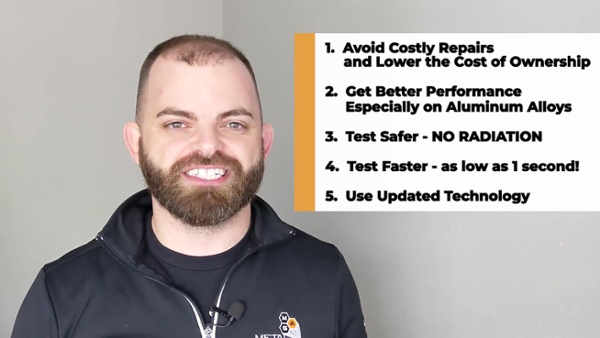12 min read
Portable Optical Emission Spectrometers (OES): Everything You Need to Know
The manufacturing industry has little to no tolerance for error. That means suppliers often need to know the exact composition of the metallic alloys...
2 min read
Chris Carolan : Mar 13, 2023 6:01:58 PM

Today I want to share the Top 5 Reasons you should trade-in your handheld XRF.
If you have ever had to pay for a repair to your handheld XRF, you know exactly what I am talking about. With expensive, fragile components like X-ray tubes & detectors, repairs can cost upwards of
$6,000-$10,000 or more depending on the make and model. For reference, the most expensive handheld LIBS repair is usually around $3,000. If you have avoided repairs up to this point, good work, most XRF components are spec'd to last 5-10 years depending on the usage. Don't wait for the next XRF repair to break the bank.
In fact, instead of spending $10,000 on a repair, Get Up To $10,000 in Trade-In Value Towards the Purchase of a New LIBS
Handheld analyzers have come a long way in the last 5 years with much better capabilities. A primary example of this is the ability of handheld LIBS to measure light elements like Magnesium and Silicon better than XRF. This allows for much faster, safer, and accurate sorting of Aluminum alloys and other metals where light elements are the key difference maker.
| Alloys Identified in 3 seconds or less by LIBS | How Does Handheld XRF Perform? |
| All Cast Aluminum Alloys < 3 seconds | Requires 15+ seconds for proper Si measurement |
| 2XXX Series with Lithium < 3 seconds | Cannot Do Lithium |
| All 5000 Series < 3 seconds | Requires 15+ seconds for proper Mg measurement |
| 2014 vs 2024 < 3 seconds | Requires 15+ seconds for proper Mg measurement |
| 3003 vs 3004 vs 3005 < 3 seconds | Requires 20+ seconds for proper Mg measurement |
| 3105 < 3 seconds | Requires 15+ seconds for Mg detection of 0.2-0.8% |
| 4032 < 3 seconds | Requires 15+ seconds for proper Si measurement |
| 1100 vs 6061 vs 6063 < 3 seconds | Requires 30+ seconds to measure Mg & Si properly |
| Aluminum Bronzes < 3 seconds | Requires 15+ seconds for proper Al measurement |
| Silicon Bronzes < 3 seconds | Requires 15+ seconds for proper Si measurement |
| Beryllium Coppers < 3 seconds | Cannot Do Beryllium |
It's 2020 and you no longer have to use RADIATION to identify your metals. Laser-based technology like handheld LIBS is a proven and viable alternative to XRF for alloy grade identification. Not only will you not be exposing yourself to the hazards of radiation, you won't have the headaches that come with government regulation of radiation-emitting devices.
Most new analyzers today, handheld XRF included, will tell you everything you need to know in less than 5-10 seconds. With handheld LIBS, the test time can be as low as 1 second! So if you are out there holding the XRF trigger for 10, 15, 20 seconds, imagine how much time you would save if you could get a result 10 times faster.
Just like your smart phone, smart TV, or smart…refrigerator? Technology moves on. New handheld metal analyzers offer major productivity upgrades like WI-FI and Bluetooth connectivity, automated data management and reporting, and integrated cameras for things like sample image tagging & bar code scanning. So if you are still writing down the results or taking pictures of the results with the latest smart phone, maybe it's time to upgrade to the latest metal analyzer and watch your productivity skyrocket.
But don't worry, even if it is broken and waiting for repair, your handheld XRF still has value. Just share the make, model, and a picture with us and we can tell you how much it's worth.
To Recap, the top 5 reasons to trade-in your handheld XRF are:
Until next time…Never Stop Testing Your Metal.
12 min read
The manufacturing industry has little to no tolerance for error. That means suppliers often need to know the exact composition of the metallic alloys...
2 min read
The MAG Industrial Training Institute will provide PMI Training Program to support void in PMI Qualification & Certification
11 min read
If you’re a metal maniac like me, I’m assuming you know about handheld XRF and what a staple it is in Positive Material Identification (and if not, ...